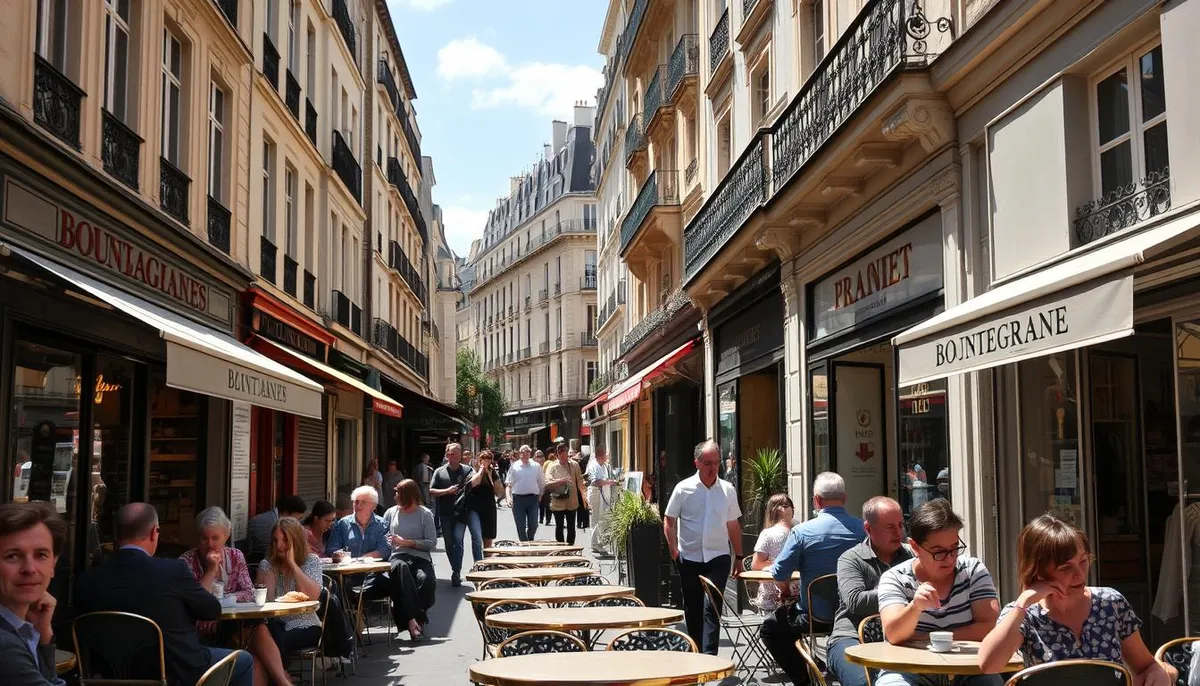The French culture is renowned for its richness and diversity, shaping the identity of contemporary French society. Over the centuries, it has evolved to create a unique model recognizable worldwide.

The republican values and daily social codes are key elements of this culture. In an increasingly globalized world, understanding the specific cultural traits of France is essential.
French culture influences behaviors, attitudes, and social interactions in today's society, making France a distinct nation in the world.
The foundations of French culture
Republican values and historical heritage are essential to understanding French culture. The French republic is founded on three fundamental values: Liberty, Equality, Fraternity. This national motto is a legacy of the Enlightenment and was first invoked during the French Revolution in 1789.
Republican values: Liberty, Equality, Fraternity
Liberty pertains to all areas, such as freedom of expression or freedom of thought. Equality is guaranteed by universal suffrage and implies that all citizens have the same rights and duties. Fraternity means solidarity among citizens. These essential principles underpin society and current values.
The historical heritage and its influence
The history of France has shaped its current culture. Major events such as the French Revolution have had a profound impact on institutions and social practices. The historical heritage is visible in monuments, museums, and national celebrations.
National symbols and their significance
National symbols such as the tricolor flag, Marianne, and the national anthem represent French values. These symbols play a crucial role in communicating values and national identity.
In summary, the foundations of French culture are deeply rooted in its republican values and historical heritage. These elements create a coherent whole that distinguishes France on the international stage.
The French cultural example in everyday life
French culture is experienced daily through rules of politeness and specific behaviors. Social interactions in France are governed by social codes that give a meaning to interpersonal relationships.
Social codes and French politeness
Politeness is a fundamental value in French culture. Saying “hello” before asking for something is considered a basic rule. Failing to respect this rule is perceived as impolite. For example, not greeting a salesperson before making a request is seen as rude.
These social codes are learned and passed down from generation to generation, forming a cultural foundation shared by the French.

The formal and informal address: a linguistic subtlety
The distinction between “tu” and “vous” is crucial in the French language. The formal address is used to speak to a stranger, a superior, or in a formal setting. This linguistic subtlety reflects the French social structure and gives a meaning to relationships.
The choice between “tu” and “vous” depends on the context and the relationship between the speakers.
Direct and indirect communication
The French can be very direct in expressing their opinions, valuing frankness and humor. However, they can also be indirect in certain social contexts, using an implicit mode of communication that allows for ambiguities.
This duality in French communication can sometimes confuse foreigners, but it is an essential aspect of French culture.
By understanding these behaviors and communication rules, one can better grasp the French cultural example in everyday life.
Gastronomy as the quintessential cultural example
France is famous for its gastronomy, which is listed as an intangible cultural heritage by UNESCO. Gastronomy is at the heart of the culinary tradition and French culture, reflecting its history and values. It represents an essential aspect of national identity and plays a central role in daily life and celebrations.
The French meal: a social ritual
The French meal is much more than just an act of nourishment; it is a true social ritual. It occupies a central place in daily life, structuring days and family gatherings. Meals are moments of conviviality and sharing, where the values of French culture are highlighted.
The art of the table and its rules
The French art of the table is governed by codes and traditions that reflect the history and cultural richness of the country. The presentation of dishes, the use of cutlery, and the order of service are all elements that contribute to making the meal a refined experience.
Defending culinary heritage
France actively defends its culinary heritage against globalization. Quality labels and the promotion of local products are means used to preserve culinary traditions. This defense of heritage is essential to maintain the French gastronomic identity.
In summary, French gastronomy embodies the values of sharing, conviviality, and excellence that characterize the culture . It serves as a strong identity marker and continues to play an essential role in French society.
Social and professional relationships
In France, relational dynamics are influenced by specific cultural factors. Social and professional relationships are characterized by a certain formality and well-established codes of conduct.
Hierarchy and its importance in French society
The hierarchical distance in France is relatively high compared to other cultures, particularly the Anglo-Saxon world. This hierarchy is decisive in interpersonal and professional relationships, structuring interactions and valuing respect for social positions.
The importance of hierarchy is reflected in the way individuals interact with one another, with marked deference towards authority figures.
The art of conversation and debate
Debate is regarded in France as an art of living. The French enjoy discussing serious topics such as current affairs, society, politics, and ideas. This culture of debate is fundamental in French social and intellectual life.
Social taboos: money and privacy
Certain topics remain taboo in French society, particularly questions of salary and money. It is generally considered impolite to ask someone about their salary or to openly discuss one’s own remuneration. Similarly, outward signs of wealth are not well perceived.
| Cultural Aspect | Description | Impact on Relationships |
|---|---|---|
| Hierarchy | High hierarchical distance | Respect for social positions |
| Debate | Fundamental cultural value | Exchange of ideas and rhetoric |
| Social Taboos | Money and privacy | Discretion in communication |
By understanding these relational codes, one can better appreciate how they influence the building of trust and the development of lasting relationships in French society.
The cultural example in French companies
The corporate culture in France plays a major role in employee retention and overall success. French companies highlight their unique cultural example to stand out in the market and promote a collaborative work environment.
French management models
The specifics of management in France include an intellectual approach and a certain hierarchical distance. Companies value degrees and encourage the debate of ideas, thus fostering the emergence of innovative solutions.
Corporate culture and its specifics
The corporate culture in France is characterized by the importance given to debate, seeking consensus, and valuing creative solutions. This contributes to a dynamic work environment where employees feel involved in the development of the company.
Examples of emblematic companies
Companies like Michelin and Decathlon perfectly illustrate French management. Michelin, for instance, has developed a strong corporate culture centered on people, with HR training for managers to adopt a more horizontal and collaborative team management. Decathlon, on the other hand, has placed the values of sports at the heart of its management, encouraging initiative and collective intelligence. These examples show how French companies can combine cultural tradition and managerial innovation to achieve success.
Cultural shock and adaptation to French culture
Cultural shock is a common reaction among people who move to France. This experience can be triggered by the loss of familiar references in social and daily interactions.

Stages of cultural shock
Three main phases of adaptation are generally identified: the honeymoon, confrontation, and adaptation. During the honeymoon, everything seems new and exciting. However, the confrontation with daily reality can prove difficult.
How to adapt
To adapt effectively, it is crucial to inform oneself about France, document daily life, and familiarize oneself with local traditions and customs. Mental preparation is also essential.
| Stages | Characteristics | Tips |
|---|---|---|
| Honeymoon | Discovery, enthusiasm | Enjoy the experience |
| Confrontation | Difficulties, frustration | Take a step back, observe |
| Adaptation | Understanding, integration | Participate actively in local life |
Intercultural misunderstandings
Misunderstandings can arise around direct or indirect communication, formal politeness, and relational expectations. A good knowledge of the culture and an open attitude facilitate learning and adaptation.
In summary, understanding and anticipating cultural shock allows for better adaptation to the French cultural environment, thus fostering openness to the world.
Conclusion: the evolution of the French cultural example in a globalized world
The French cultural example, characterized by its republican values and historical heritage, adapts to contemporary challenges while preserving its distinctive identity. The French culture, rich in its history, continues to play a prominent role on the international stage.
In a globalized world, French society faces challenges related to integrating external influences while maintaining its cultural specificities, including the evolving online culture. This evolution raises questions about the ability of French culture to remain relevant.
Cultural diplomacy and Francophonie are important vectors of the ongoing influence of French culture around the world. France continues to promote its values and cultural heritage, thus contributing to global cultural diversity.
However, the French cultural example must navigate between preserving its traditional heritage and the necessities of evolution in an interconnected world. This balance is crucial for its future and relevance in a constantly changing world.
In conclusion, understanding the specificities of French culture is essential for facilitating successful intercultural exchanges, both for visitors and for foreign residents in France. The ability of French society to maintain its identity while opening up to international exchanges will be decisive for its future influence.
RelatedRelated articles


